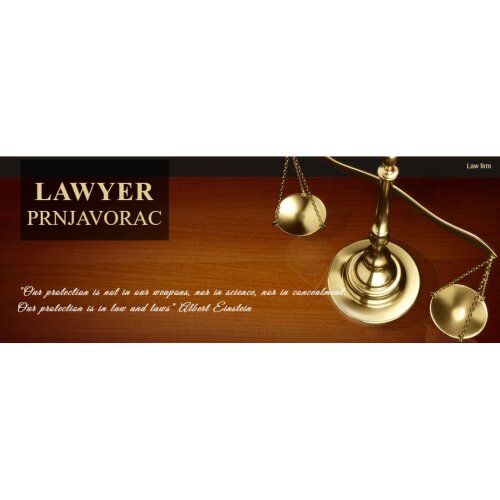Best Debt Capital Markets Lawyers in Bosnia and Herzegovina
Share your needs with us, get contacted by law firms.
Free. Takes 2 min.
Or refine your search by selecting a city:
List of the best lawyers in Bosnia and Herzegovina
About Debt Capital Markets Law in Bosnia and Herzegovina
Debt Capital Markets (DCM) refer to the system and processes by which entities such as corporations, financial institutions, and governments raise funds from investors through the issuance of debt securities, such as bonds. In Bosnia and Herzegovina, the DCM sector remains relatively less developed compared to some European markets but is evolving as regulatory frameworks mature and market participants seek alternative ways to access funding. The process involves multiple legal steps and requires compliance with local and international regulations, with oversight by state and entity-level securities commissions. Bosnia and Herzegovina's legal landscape is unique due to its dual-entity system, requiring careful attention to both state and entity-level regulations.
Why You May Need a Lawyer
Legal help in Debt Capital Markets is essential for navigating complex regulations, drafting documentation, and ensuring compliance with both domestic and international laws. Some common situations where individuals and businesses may require legal assistance include:
- Structuring and issuing bonds or other debt instruments
- Listing debt securities on the Sarajevo or Banja Luka stock exchange
- Conducting due diligence for a potential investment in debt instruments
- Advising on cross-border offerings and related compliance matters
- Resolving disputes involving the interpretation of debt instruments or market regulations
- Managing regulatory notifications and submissions
- Advising on taxation issues related to capital markets activities
- Navigating insolvency risks or restructuring of listed debt
- Ensuring disclosure requirements are met for public offerings
- Dealing with sanctions, anti-money laundering, and investor protection requirements
Given the complexity and regulatory scrutiny of these transactions, professional legal guidance is crucial to avoid pitfalls and ensure transactions are valid and enforceable.
Local Laws Overview
Debt Capital Markets in Bosnia and Herzegovina are regulated by a mix of state and entity-level laws, reflecting the country’s administrative structure. Key aspects include:
- Legal Framework: Securities regulation is influenced by both the Federation of Bosnia and Herzegovina and the Republika Srpska, each with its own securities commission and capital market regulations. The state-level Securities Market Law, entity-level capital market laws, and relevant bylaws provide the legal foundation.
- Bonds and Debt Instruments: Issuers must comply with prospectus and disclosure requirements, register securities offerings with the appropriate authority, and adhere to the rules of local stock exchanges (Sarajevo Stock Exchange or Banja Luka Stock Exchange).
- Listing and Trading: Debt securities can be listed and traded but need to meet exchange-specific criteria, including governance, size, and documentation standards.
- Public and Private Offerings: There are distinct rules for public versus private placements, with public offerings generally subject to more stringent requirements.
- Taxation: The tax treatment of interest, gains, and transactions in the debt capital markets is regulated at both state and entity levels and should be carefully considered in structuring deals.
- Investors' Rights and Protections: Regulation focuses on disclosure, transparency, and protection against market abuse, including insider trading and manipulation.
- Anti-Money Laundering: Issuers and market participants are subject to strict anti-money laundering and counter-terrorism financing rules.
Given overlapping and sometimes divergent regulations, it is essential to consult a legal specialist with expertise in the specific entity where a transaction is taking place.
Frequently Asked Questions
What is the main regulatory body overseeing Debt Capital Markets in Bosnia and Herzegovina?
The Securities Commission of the Federation of Bosnia and Herzegovina or the Republika Srpska Securities Commission, depending on the location of the transaction, are the key regulatory authorities.
Are foreign investors allowed to invest in Bosnian debt securities?
Yes, foreign investors can participate in the Bosnian debt capital markets, subject to local registration and compliance with relevant regulations.
What types of debt instruments are commonly issued?
Government and municipal bonds, corporate bonds, and short-term instruments such as commercial paper are the most common in Bosnia and Herzegovina.
What are the key requirements for issuing debt securities?
Issuers must prepare a prospectus, obtain regulatory approval, and ensure compliance with listing requirements if the instrument is to be traded on an exchange.
What is a prospectus and why is it important?
A prospectus is a comprehensive disclosure document required for public offerings that provides potential investors with all material information about the issuer and the securities being offered.
Can debt securities be issued through private placements?
Yes, private placements are possible and subject to less rigorous disclosure obligations than public offerings, but must still comply with certain legal standards.
How are interest payments and bond redemptions taxed?
Interest income is generally subject to income tax, and capital gains may also be taxed, depending on current tax laws. The specifics vary between the Federation and Republika Srpska.
What protections do investors have against fraud or misrepresentation?
Investors are protected by disclosure requirements and anti-fraud provisions in capital markets laws, and violations can lead to civil and criminal penalties.
What happens if an issuer defaults on its debt?
Legal remedies, including court proceedings and potential restructuring, are available. Holders of debt securities generally have claims against the issuer in insolvency proceedings.
Do I need a local representative or legal advisor to participate in these markets?
While not always legally required, having a local legal advisor is highly recommended to navigate compliance, tax, and regulatory issues specific to Bosnia and Herzegovina.
Additional Resources
If you need further information or assistance, consider contacting the following organizations:
- Securities Commission of the Federation of Bosnia and Herzegovina
- Republika Srpska Securities Commission
- Sarajevo Stock Exchange (SASE)
- Banja Luka Stock Exchange (BLSE)
- Chambers of Commerce of the Federation and Republika Srpska
- Ministry of Finance of Bosnia and Herzegovina
- Local law firms specializing in corporate and capital markets law
These organizations can provide guidance on regulation, listings, investor protections, and other relevant areas.
Next Steps
If you are considering involvement in Debt Capital Markets in Bosnia and Herzegovina or need tailored legal advice, here are suggested steps:
- Identify whether your activity falls within the Federation or the Republika Srpska jurisdiction
- Consult publicly available regulations and resources or contact relevant regulatory authorities
- Retain a legal advisor with proven experience in DCM transactions in Bosnia and Herzegovina
- Prepare all necessary documentation, including prospectuses and submissions, in alignment with legal requirements
- Stay up to date on changes in taxation, disclosure standards, and securities regulations
- Seek ongoing legal support to ensure compliance throughout the lifecycle of your investment or issuance
Engaging a qualified lawyer will help you mitigate risks, ensure regulatory compliance, and navigate the complexities of the Bosnian capital markets with confidence.
Lawzana helps you find the best lawyers and law firms in Bosnia and Herzegovina through a curated and pre-screened list of qualified legal professionals. Our platform offers rankings and detailed profiles of attorneys and law firms, allowing you to compare based on practice areas, including Debt Capital Markets, experience, and client feedback.
Each profile includes a description of the firm's areas of practice, client reviews, team members and partners, year of establishment, spoken languages, office locations, contact information, social media presence, and any published articles or resources. Most firms on our platform speak English and are experienced in both local and international legal matters.
Get a quote from top-rated law firms in Bosnia and Herzegovina — quickly, securely, and without unnecessary hassle.
Disclaimer:
The information provided on this page is for general informational purposes only and does not constitute legal advice. While we strive to ensure the accuracy and relevance of the content, legal information may change over time, and interpretations of the law can vary. You should always consult with a qualified legal professional for advice specific to your situation.
We disclaim all liability for actions taken or not taken based on the content of this page. If you believe any information is incorrect or outdated, please contact us, and we will review and update it where appropriate.
Browse debt capital markets law firms by city in Bosnia and Herzegovina
Refine your search by selecting a city.













